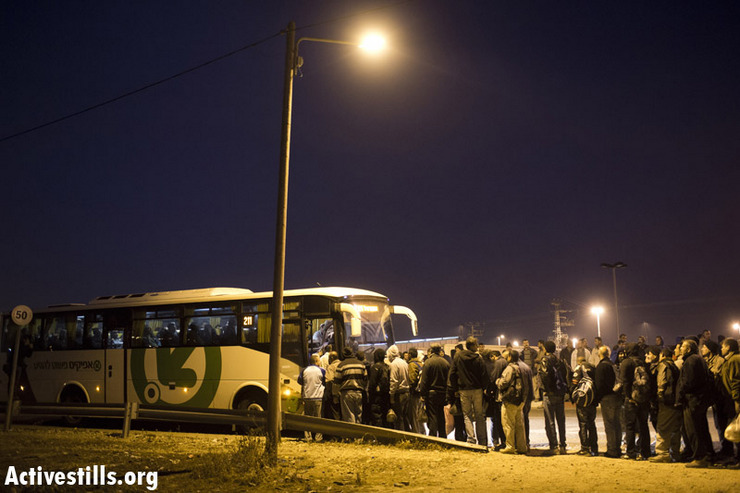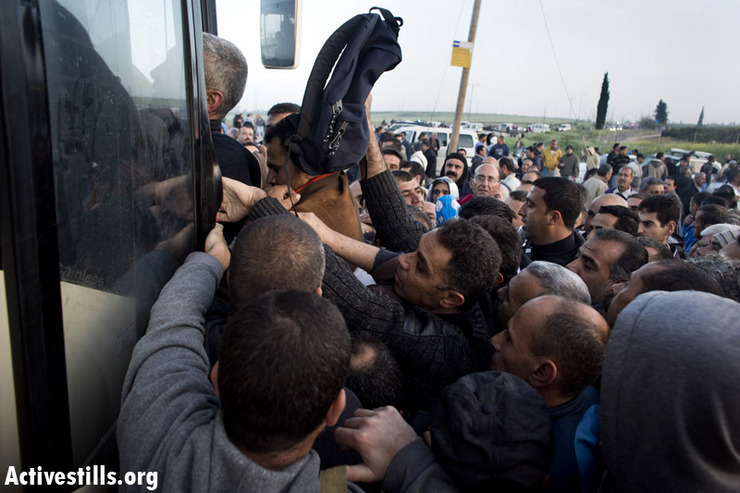Segregating the Evening Commute to the West Bank
PALESTINE - ISRAEL, 3 Nov 2014
Michael Schaeffer Omer-Man - +972 Magazine
Jews and Palestinians who commute from the West Bank to work in central Israel each day will soon ride separate buses home. Let’s not give too much credit to Defense Minister Moshe Ya’alon, however. The decision to segregate the evening commute wasn’t all that creative. He only completed his predecessors’ decision to segregate the morning commute.

Palestinian workers wait in line to board an Israeli bus line meant for Palestinians only after crossing the Eyal checkpoint from the West Bank into Israel proper. (Photo by Activestills.org)
It’s not really segregation. Not on paper at least. Or at least the paper doesn’t use the word “segregation.” In practice, however, people of one national origin will not be allowed to ride on the same bus lines as people of another national origin — for the benefit and at the request of one group, at the expense and against the desires of the other. Call that what you will.
Here’s how it works. Israeli Defense Minister Moshe Ya’alon, the de facto and de jure sovereign ruler of the West Bank, could have easily ordered his generals to revise Israeli military law to legally ban Palestinians from riding on the same buses as their Jewish Israeli neighbors. (It’s important to remember at this junction, no pun intended, that we are talking about two groups of people who live in the same place — the West Bank — and who each day commute back and forth to their workplaces in the same place — central Israel.)
If that military order had been issued so explicitly, however, it would actually be called segregation and understood to be segregation by the general public, which at least in theory, sometimes opposes segregation. If the defense minister had written such an order it probably would have even used the Hebrew word “hafrada,” which inconveniently means both separation and segregation. That wouldn’t have looked good. So Ya’alon found another way, one that didn’t require him to use such politically loaded words.
Instead, the defense minister ordered that Palestinian commuters return to their West Bank homes through a specific, dedicated checkpoint — a different checkpoint than the Jewish commuters with whom they shared their evening bus rides until now. Technically speaking, Palestinians with valid work permits are still allowed to ride Israeli buses; they just aren’t allowed to go through the checkpoints through which those buses pass. Which means they will have to travel a different route, and therefore, ride separate buses.
Let’s not give too much credit to Ya’alon, however. The decision to segregate the evening commute wasn’t all that creative. He was only completing his predecessors’ decision to segregate the morning commute.
See more photos of the segregated checkpoint here.
On the sidelines of Ya’alon’s decision, an argument took place between two people in uniform about whether the segregation is necessitated — or even motivated — by security. According to Maj.-Gen. Nitzan Alon, who happens to be the commander in charge of the Israeli army’s entire operations in the West Bank (or in other words, the occupation), Palestinian and Israeli commuters sharing buses poses no security risk, Haaretz reported Sunday. Another man in uniform, one who apparently has neither name nor rank, declared that the only considerations in the new policy are security considerations. Go figure.
Don’t expect a huge fallout
The new policy will have only a couple of effects, neither of which are significant enough to endanger the two-state solution or move a single foreign government to change the course of their Mideast foreign policy.
First and foremost, the new segregated evening commute will do exactly what it was designed to: segregate the evening commute. Jewish settlers will be able to enjoy their ride home from Tel Aviv through the fertile West Bank foothills of Palestinian olive country without the annoyance of having to listen to other commuters speaking Arabic. Haaretz quoted MK Moti Yogev (The Jewish Home), a settler himself and member of the Israeli parliament’s ruling coalition, after riding one of the yet-to-be-segregated buses: “Riding these buses is unreasonable. They are full of Arabs.”
The second consequence is just slightly more politically correct, or less, depending on how you like your racism, civil rights and labor conditions. Palestinian laborers, who are forbidden from remaining inside Israel proper at night, will be forced to take longer routes home to their families every evening. Already, they arrive at the checkpoint before the crack of dawn in order to make it to work in the morning. Just another hardship of the occupation — nothing to write to the UN about.
As Amjad Iraqi wrote here on +972 when the morning buses were segregated last year:
This is certainly not the worst case of state-sanctioned discrimination in the Occupied Territories, and it won’t be the last. What makes the bus case notable, however, is that it starkly presents the pervasiveness of the state’s segregationist mentality by evoking the memory of the infamous buses under the Jim Crow laws of the southern United States.
On a related note, Arab minority rights organization Adalah filed a lawsuit against the segregation of an Israeli youth soccer league along Jewish-Palestinian lines. The decision to segregate the Jewish and Arab youth teams into different leagues was apparently made in response to complaints by Jewish parents, according to a statement by Adalah.
_________________________________
Related:
Palestinian-only buses serve to incentivize segregation
Photos: Israel’s ‘Palestinian only’ segregated bus lines
West Bank and East Jerusalem buses are already segregated
Read more on Palestinian laborers working in Israel
Join the BDS-BOYCOTT, DIVESTMENT, SANCTIONS campaign to protest the Israeli barbaric siege of Gaza, illegal occupation of the Palestine nation’s territory, the apartheid wall, its inhuman and degrading treatment of the Palestinian people, and the more than 7,000 Palestinian men, women, elderly and children arbitrarily locked up in Israeli prisons.
DON’T BUY PRODUCTS WHOSE BARCODE STARTS WITH 729, which indicates that it is produced in Israel. DO YOUR PART! MAKE A DIFFERENCE!
7 2 9: BOYCOTT FOR JUSTICE!
DISCLAIMER: The statements, views and opinions expressed in pieces republished here are solely those of the authors and do not necessarily represent those of TMS. In accordance with title 17 U.S.C. section 107, this material is distributed without profit to those who have expressed a prior interest in receiving the included information for research and educational purposes. TMS has no affiliation whatsoever with the originator of this article nor is TMS endorsed or sponsored by the originator. “GO TO ORIGINAL” links are provided as a convenience to our readers and allow for verification of authenticity. However, as originating pages are often updated by their originating host sites, the versions posted may not match the versions our readers view when clicking the “GO TO ORIGINAL” links. This site contains copyrighted material the use of which has not always been specifically authorized by the copyright owner. We are making such material available in our efforts to advance understanding of environmental, political, human rights, economic, democracy, scientific, and social justice issues, etc. We believe this constitutes a ‘fair use’ of any such copyrighted material as provided for in section 107 of the US Copyright Law. In accordance with Title 17 U.S.C. Section 107, the material on this site is distributed without profit to those who have expressed a prior interest in receiving the included information for research and educational purposes. For more information go to: http://www.law.cornell.edu/uscode/17/107.shtml. If you wish to use copyrighted material from this site for purposes of your own that go beyond ‘fair use’, you must obtain permission from the copyright owner.
Read more
Click here to go to the current weekly digest or pick another article:
PALESTINE - ISRAEL:
